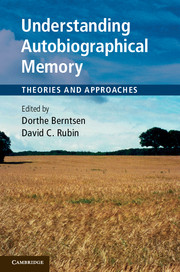Book contents
- Frontmatter
- Contents
- List of figures
- List of tables
- List of contributors
- Preface
- Acknowledgements
- 1 Introduction
- Part I Approaches to the study of autobiographical memory
- Part II Neural studies of autobiographical memory
- Part III Social and cultural aspects of autobiographical memory
- 8 Of sins and virtues: memory and collective identity
- 9 Historically defined autobiographical periods: their origins and implications
- 10 Directive functions of autobiographical memory: theory and method
- Part IV Development of autobiographical memory from infancy to old age
- Part V Evolution and basic processes of autobiographical memory
- Part VI Discussion
- Index
- References
9 - Historically defined autobiographical periods: their origins and implications
Published online by Cambridge University Press: 05 November 2012
- Frontmatter
- Contents
- List of figures
- List of tables
- List of contributors
- Preface
- Acknowledgements
- 1 Introduction
- Part I Approaches to the study of autobiographical memory
- Part II Neural studies of autobiographical memory
- Part III Social and cultural aspects of autobiographical memory
- 8 Of sins and virtues: memory and collective identity
- 9 Historically defined autobiographical periods: their origins and implications
- 10 Directive functions of autobiographical memory: theory and method
- Part IV Development of autobiographical memory from infancy to old age
- Part V Evolution and basic processes of autobiographical memory
- Part VI Discussion
- Index
- References
Summary
Historically significant public events sometimes organize autobiographical memory, acting as temporal landmarks and providing the thematic content which defines the lifetime periods they spawn (Brown and Lee, 2010; Brown, Lee, Krslak, et al., 2009). We begin this chapter by briefly reviewing a research program that has demonstrated the existence of these historically defined autobiographical periods and that has allowed us to identify the conditions that bring them about. In this section, we also present data from four samples of World War II-generation adults, data which prove that historically defined autobiographical periods endure over time. Next, we consider the theoretical implications of these findings. In particular, we introduce a new approach to autobiographical memory called the transition theory. This approach assumes that autobiographical memory is organized by transitional events and that these transitions can be self-initiated or externally imposed. On this view, historically defined autobiographical periods are formed by externally imposed transitions. We develop this point in the third and final section of this chapter.
The living-in-history project
War, terrorism, and natural disasters can have far-reaching effects on the lives of those involved (Blaikie, Cannon, Davis, et al., 1994; Levy and Sidel, 1997; McNally, 2003). Collective memory for extraordinary social events can also play a critical role in the construction and maintenance of group identities and in the persistence of intergroup hostility (Bar-Tal, 2007; Cairns and Roe, 2003; Halbwachs, 1992; Hirst, Cuc, and Wohl, this volume). Our project examined the mnemonic impact of public events at the individual level in order to understand when autobiographical memory and historical events can become intertwined. More specifically, the program of research was undertaken to determine whether public events affect the organization of autobiographical memory and to specify the conditions that result in the creation of historically defined autobiographical periods. We were interested in this issue because we suspected that people who had “lived in history” might understand the recent past in a different way than those who had not, and that this understanding might ground current and future beliefs about that past. For this reason, we wanted to identify public events that caused people to “live in history” and to distinguish these epoch-defining events from other significant public events.
- Type
- Chapter
- Information
- Understanding Autobiographical MemoryTheories and Approaches, pp. 160 - 180Publisher: Cambridge University PressPrint publication year: 2012
References
- 33
- Cited by



